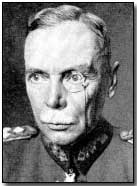Who's Who - Hans von Seeckt
 Johannes Friedrich Leopold von Seeckt
(1866-1936) established a reputation for first-rate staff work prior to and
during World War One and was
Paul von Hindenburg's
successor as army Chief of Staff in the wake of Germany's military defeat in
November 1918.
Johannes Friedrich Leopold von Seeckt
(1866-1936) established a reputation for first-rate staff work prior to and
during World War One and was
Paul von Hindenburg's
successor as army Chief of Staff in the wake of Germany's military defeat in
November 1918.
Seeckt entered the German army in 1885 while aged 18. From an early stage Seeckt's aptitude for staff work became apparent with the result he was seconded to the General Staff in 1899 while still only ranked a Lieutenant.
Until the outbreak of war in August 1914 Seeckt served primarily in staff appointments, rising to Colonel. With war underway he was assigned to III Corps as Chief of Staff, attached to Alexander von Kluck's First Army. With von Kluck tasked with no less a matter than the invasion of France Seeckt's career quickly burgeoned in his high-profile role.
Newly-promoted Major-General, Seeckt was subsequently appointed Chief of Staff to August von Mackensen and his Eleventh Army, this time on the Eastern Front. Despite Mackensen's deserved reputation for military prowess Seeckt was nevertheless (correctly) credited with masterminding the breakthrough at Gorlice in May 1915, for which he received the Pour le Merite award.
Having also planned the invasion of Serbia of October 1915, Seeckt was assigned a quite different role following the Austro-Hungarian disaster during the opening stages of the spectacularly successful Russian Brusilov Offensive.
In short, he was assigned to a series of roving Chief of Staff positions within various Austro-Hungarian armies, tasked with re-shaping each and improving their battle worthiness; a sensitive task that did not always endear him to his Austro-Hungarian counterparts.
Having successfully acquitted himself in this role he was consequently assigned to the Ottoman army in December 1917 and expected to perform similar wonders; this however was a task even von Seeckt was unable to perform.
Seeckt was appointed Hindenburg's successor as Chief of Staff in summer 1919 and set about the construction of an elite force of 100,000 men - the maximum allowed under the terms of the Versailles treaty. He nevertheless ensured that the army he fashioned was capable of being rapidly expanded as and when the need arose, and arranged to secretly train German forces in Russia.
Despite failing to support the government during the Kapp Putsch of 1920 he nevertheless remained head of the army until he was pressured to resign in 1926.
Subsequently serving in the Reichstag von Seeckt later aligned himself with Hitler's Nazis. With the rise of the latter to power he was despatched to China in 1934 to assist with the modernisation of the Chinese army.
He died two years later in 1936.
"ANZAC" was coined in 1915 from the initials of the Australian and New Zealand Army Corps.
- Did you know?
